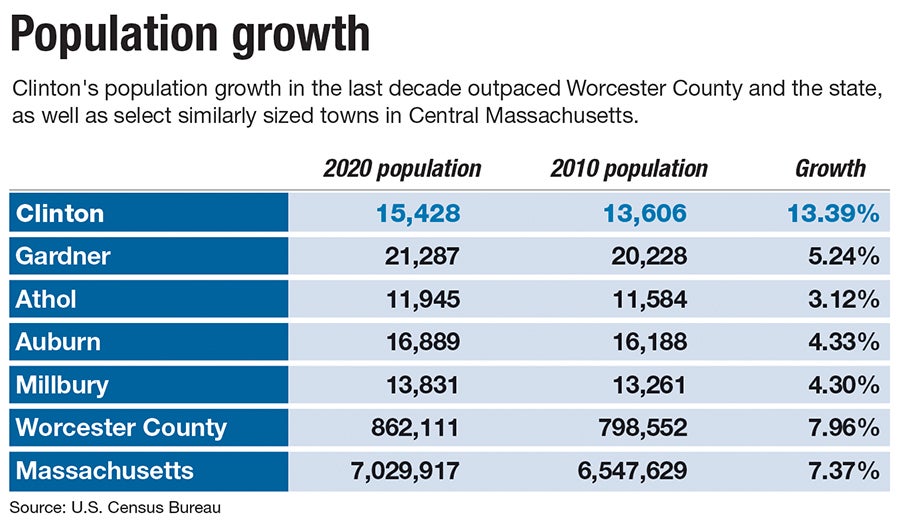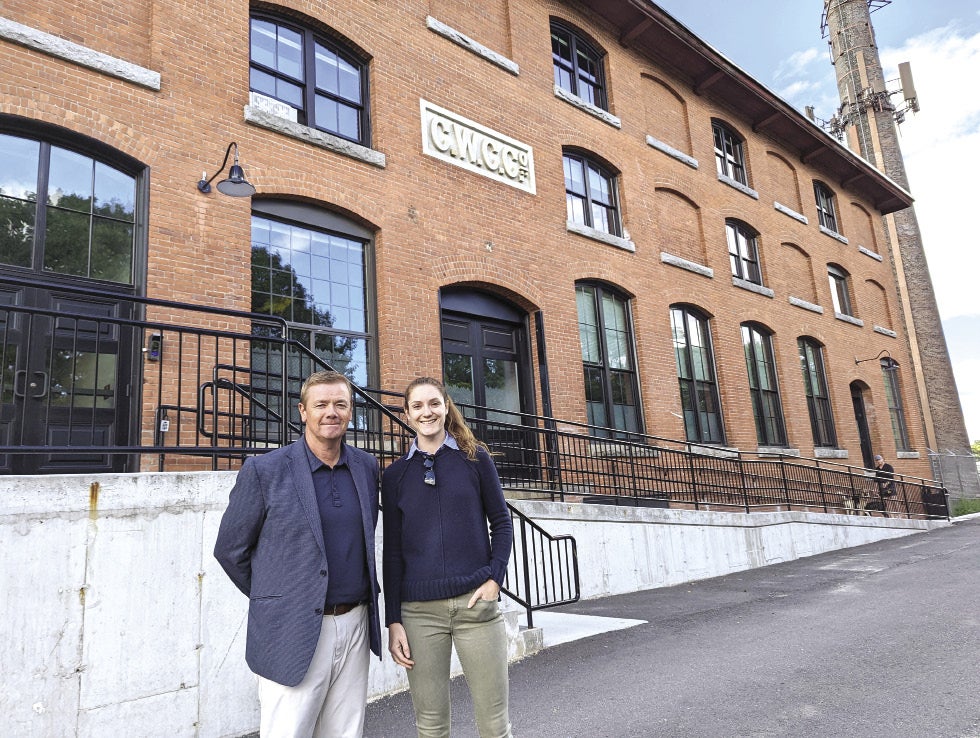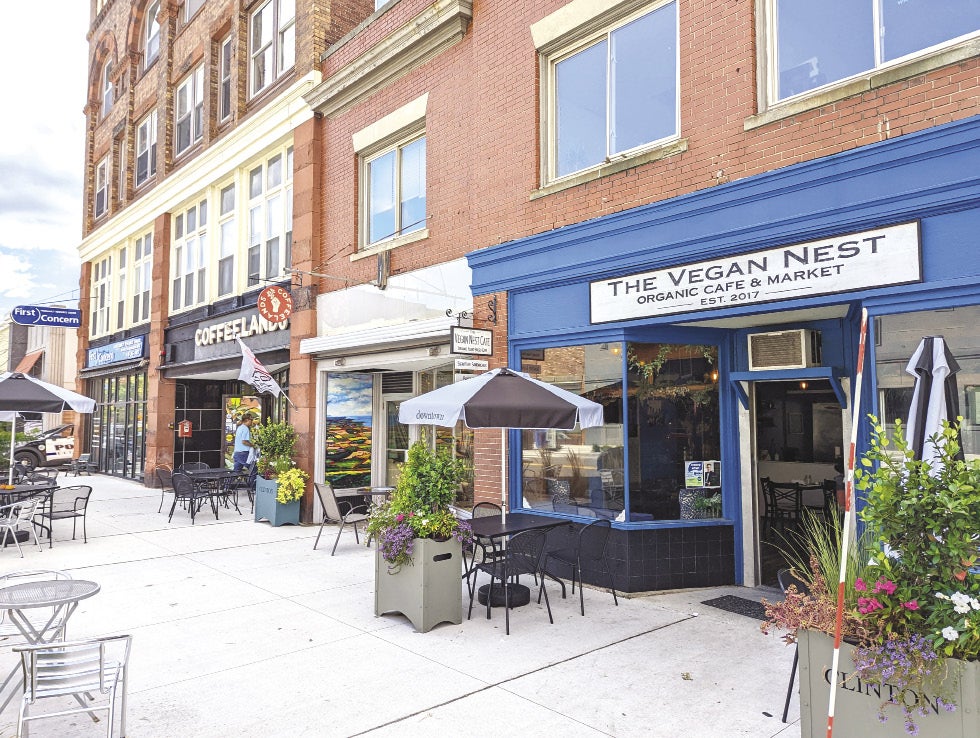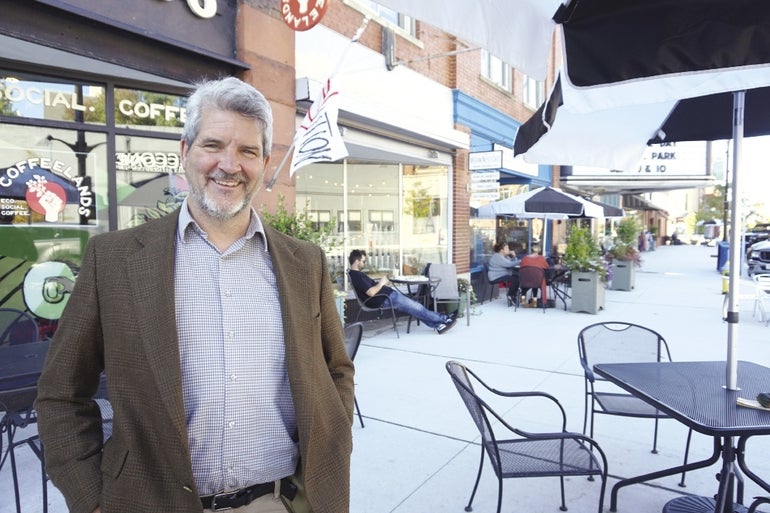Clinton packs more than 15,000 people into an area approximately three miles by two miles, making it one of the most densely populated communities outside of Route 128.
Get Instant Access to This Article
Subscribe to Worcester Business Journal and get immediate access to all of our subscriber-only content and much more.
- Critical Central Massachusetts business news updated daily.
- Immediate access to all subscriber-only content on our website.
- Bi-weekly print or digital editions of our award-winning publication.
- Special bonus issues like the WBJ Book of Lists.
- Exclusive ticket prize draws for our in-person events.
Click here to purchase a paywall bypass link for this article.
One of the first things Philip Duffy, director of economic development for the Town of Clinton, says, “We want to make Clinton a better Clinton.”
Duffy has been the director of economic development in Clinton for 11 years. An architect by background, he became enamored with Clinton after visiting the town while living in Cambridge, which is why he believes the recipe for success is for the town to be true to itself and not try to emulate another place.
In his role, Duffy’s two major goals are to develop Clinton’s downtown and to improve quality of life.
“We’re focused on improving the quality of life for the residents, not for the financial position of the town,” said Duffy, “When you provide for a higher quality of life, you attract businesses and people at the beginning of the buying cycle.”
Duffy’s philosophy seems to be working, as Clinton is rapidly growing, its population is up 13% between the 2010 and 2020 censuses. Businesses are opening along High Street, the subject of a municipal beautification project, as well as elsewhere around downtown.
Clinton packs more than 15,000 people into an area approximately three miles by two miles, making it one of the most densely populated communities outside of Route 128, said Duffy.
When Duffy started working for the town, 1 million square feet of property was underused property. Now he estimates it's between 150,000 to 250,000 square feet.

Renovating former industrial properties
Near Depot Square in Clinton, Worcester’s Cunningham Equities opened a new apartment development called Liam’s Crossing in a former Clinton Wire Cloth Co. building, offering 39 one-bedroom apartments.
The building retains the look of a factory built in 1910, but it offers modern amenities like community WiFi, a fitness room, and the ability to unlock the front door using a phone app. The main elevator has a modern car but is the size of the original freight elevator.
“We wanted to repurpose as much of the facility as possible, and that includes using the original elevator shaft,” said Chris Conry, chief information officer for Cunningham Equities, “People love it when they’re moving in.”

The development, which opened in November, is fully occupied, and Cunningham has started work on another project, called Jack’s Mill, offering 150 apartments in a former Bigelow Carpets factory building, along with 20,000 square feet of retail.
“The Town of Clinton has been very helpful. They are super-supportive of renovating distressed properties,” said Xaley Yousey, Cunningham’s manager of commercial leasing and sales.
Clinton has a zoning designation in its bylaws for repurposing mill buildings. Like many mill towns, Clinton went through a period of financial hardship after its factories closed. The downturn was actually a blessing for the old buildings.
“It wasn’t worth knocking anything down,” said Duffy.
Jack’s Mill will be completed in phases, the first of which is underway, fixing the old floors in the industrial building. Phase two will be the construction of 50 apartments, expected to be complete by spring 2023. Phases 3 and 4, each consisting of 50 units, are expected to take three or four months each.
Jack’s Mill and Liam’s Crossing join the many mills converted to housing in Clinton: The Lofts at Bigelow Mills, a condominium building on Main Street, the Lofts at Lancaster Mills, a 202-unit development built in 2011; and the Prescott Mill Apartments, offering 101 units of subsidized housing through the Mass Housing Partnership.
Yousey and Conry said people moving into the apartments are a smorgasbord of tenant profiles: Young people from the area looking for an apartment, people from outside the area looking for a less expensive alternative to Boston, MetroWest or Worcester, and people downsizing from a house to an apartment as they get older.

“An incubator for small business”
Duffy’s emphasis on developing the downtown area gives people moving into the area something to do in town, and keeps their money in Clinton, feeding the businesses lining up along High Street and elsewhere.
As part of the beautification of the downtown area, the town offers financial assistance to businesses to have attractive signage. While designs for these grants are subject to approval, there is no standard, allowing businesses to create a sign in their own styles and keeping the street from all looking the same.
One large sign along Clnton’s High Street is The Strand Theater marquee. While the sign offers current information about goings-on in the town, the theater closed during the COVID pandemic. Seeing it is an asset to downtown, the Town of Clinton secured a grant to conduct a feasibility study, researching whether the site could be turned into a performing arts center.
“The population is younger and more diverse than one would expect,” said Lee Abdella, a marketing consultant the town hired, who works with Duffy to get the word out about Clinton.
In early March, two grand opening signs hung outside of Brazilian restaurants around Depot Square: Delicias da Nossa Terra and Brazilian Flavor Bakery. On High Street, within a block of each other, businesses are opening or have recently opened: The Scarlett Nook, a gift shop, The Soulful Co., a dance and fitness studio, AB Aesthetics, a cosmetology clinic, and Revival Gifts.
“Downtown is an incubator for small businesses,” said Duffy, “As of six months ago, 62% of the businesses here were woman-owned, minority-owned, or immigrant owned.”
An organized business community
As new businesses open around Clinton, the region’s business leaders relaunched the Clinton Area Chamber of Commerce and a started local business marketing association, Discover Clinton. Lauren Crossman-Nanof started the chamber in June, as an affiliate of the Worcester Regional Chamber of Commerce.

The last chamber of commerce in Clinton was the Wachusett Chamber of Commerce, which disbanded in 2012.
“We need to earn that trust back from businesses after the old chamber fell apart,” said Crossman-Nanof, “We’ll introduce ourselves as being a resource. Some people don’t understand the benefits of being part of the chamber besides networking events.”
One benefit of the chamber, Crossman-Nanof said, is it acts as a liaison between businesses and the town, helping with permits and other matters.
“The town officials are very easy to work with,” she said.
Discover Clinton, which Crossman-Nanof also heads, is offering $2,000 grants to small businesses, made possible by the late founder of Clinton’s Museum of Russian Icons, Gordon Lankton.
Clinton is in the process of putting parts of its past behind it, while embracing the town’s character.
“One of the challenges we face,” said Crossman-Nanof, “is overcoming what Clinton used to be. It was rundown. No one cared. There was nothing to look forward to.
“There was a turnaround in 2018 or 2019,” she said, “You started seeing people walking down the streets again.”
The town has gotten younger, with the median age being around 35, said Crossman-Nanof. The town is now willing to try new things.
“The old boys club was overcome,” she said.

